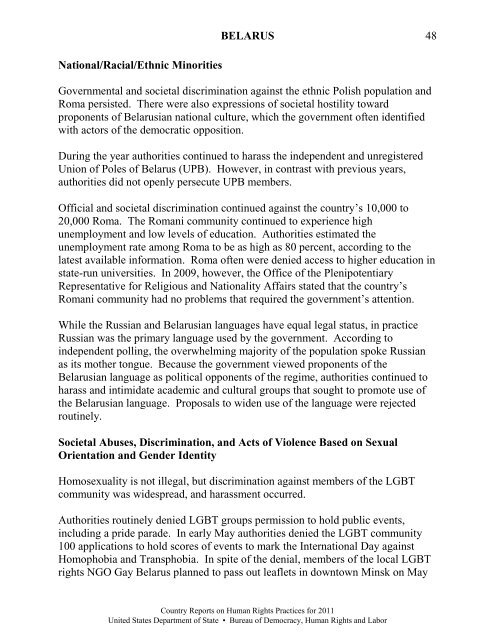belarus executive summary - US Department of State
belarus executive summary - US Department of State
belarus executive summary - US Department of State
You also want an ePaper? Increase the reach of your titles
YUMPU automatically turns print PDFs into web optimized ePapers that Google loves.
National/Racial/Ethnic Minorities<br />
BELAR<strong>US</strong> 48<br />
Governmental and societal discrimination against the ethnic Polish population and<br />
Roma persisted. There were also expressions <strong>of</strong> societal hostility toward<br />
proponents <strong>of</strong> Belarusian national culture, which the government <strong>of</strong>ten identified<br />
with actors <strong>of</strong> the democratic opposition.<br />
During the year authorities continued to harass the independent and unregistered<br />
Union <strong>of</strong> Poles <strong>of</strong> Belarus (UPB). However, in contrast with previous years,<br />
authorities did not openly persecute UPB members.<br />
Official and societal discrimination continued against the country’s 10,000 to<br />
20,000 Roma. The Romani community continued to experience high<br />
unemployment and low levels <strong>of</strong> education. Authorities estimated the<br />
unemployment rate among Roma to be as high as 80 percent, according to the<br />
latest available information. Roma <strong>of</strong>ten were denied access to higher education in<br />
state-run universities. In 2009, however, the Office <strong>of</strong> the Plenipotentiary<br />
Representative for Religious and Nationality Affairs stated that the country’s<br />
Romani community had no problems that required the government’s attention.<br />
While the Russian and Belarusian languages have equal legal status, in practice<br />
Russian was the primary language used by the government. According to<br />
independent polling, the overwhelming majority <strong>of</strong> the population spoke Russian<br />
as its mother tongue. Because the government viewed proponents <strong>of</strong> the<br />
Belarusian language as political opponents <strong>of</strong> the regime, authorities continued to<br />
harass and intimidate academic and cultural groups that sought to promote use <strong>of</strong><br />
the Belarusian language. Proposals to widen use <strong>of</strong> the language were rejected<br />
routinely.<br />
Societal Abuses, Discrimination, and Acts <strong>of</strong> Violence Based on Sexual<br />
Orientation and Gender Identity<br />
Homosexuality is not illegal, but discrimination against members <strong>of</strong> the LGBT<br />
community was widespread, and harassment occurred.<br />
Authorities routinely denied LGBT groups permission to hold public events,<br />
including a pride parade. In early May authorities denied the LGBT community<br />
100 applications to hold scores <strong>of</strong> events to mark the International Day against<br />
Homophobia and Transphobia. In spite <strong>of</strong> the denial, members <strong>of</strong> the local LGBT<br />
rights NGO Gay Belarus planned to pass out leaflets in downtown Minsk on May<br />
Country Reports on Human Rights Practices for 2011<br />
United <strong>State</strong>s <strong>Department</strong> <strong>of</strong> <strong>State</strong> • Bureau <strong>of</strong> Democracy, Human Rights and Labor
















